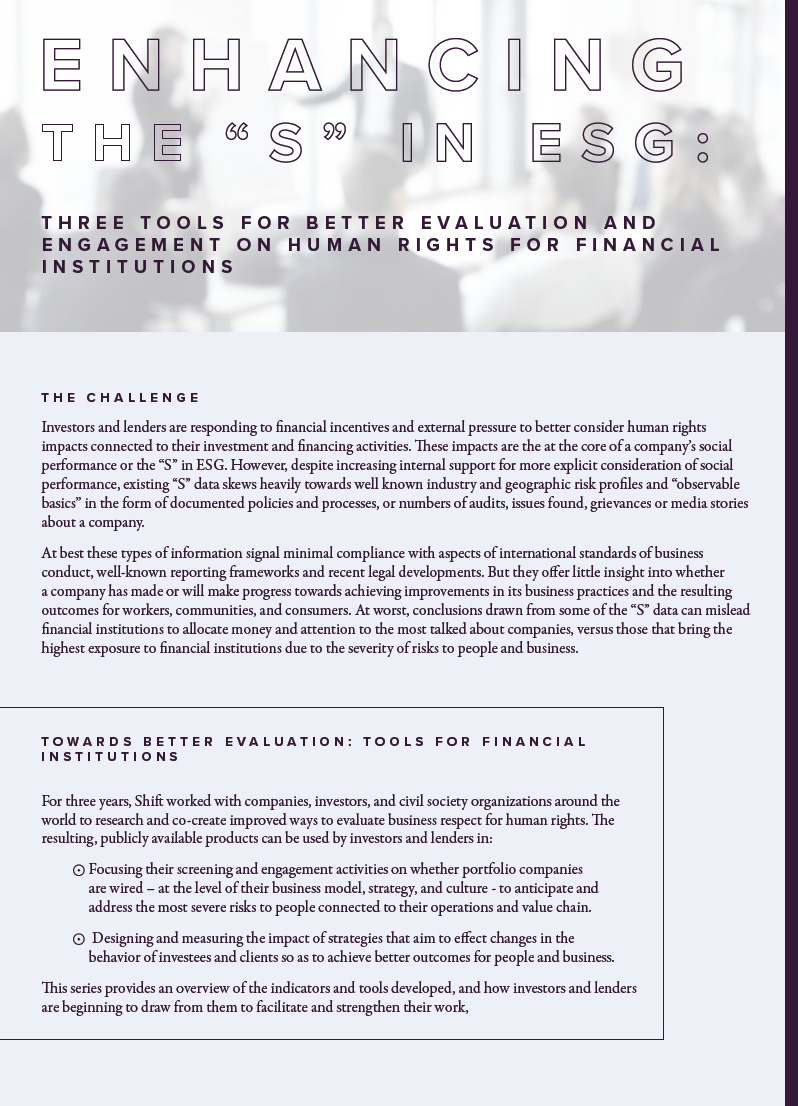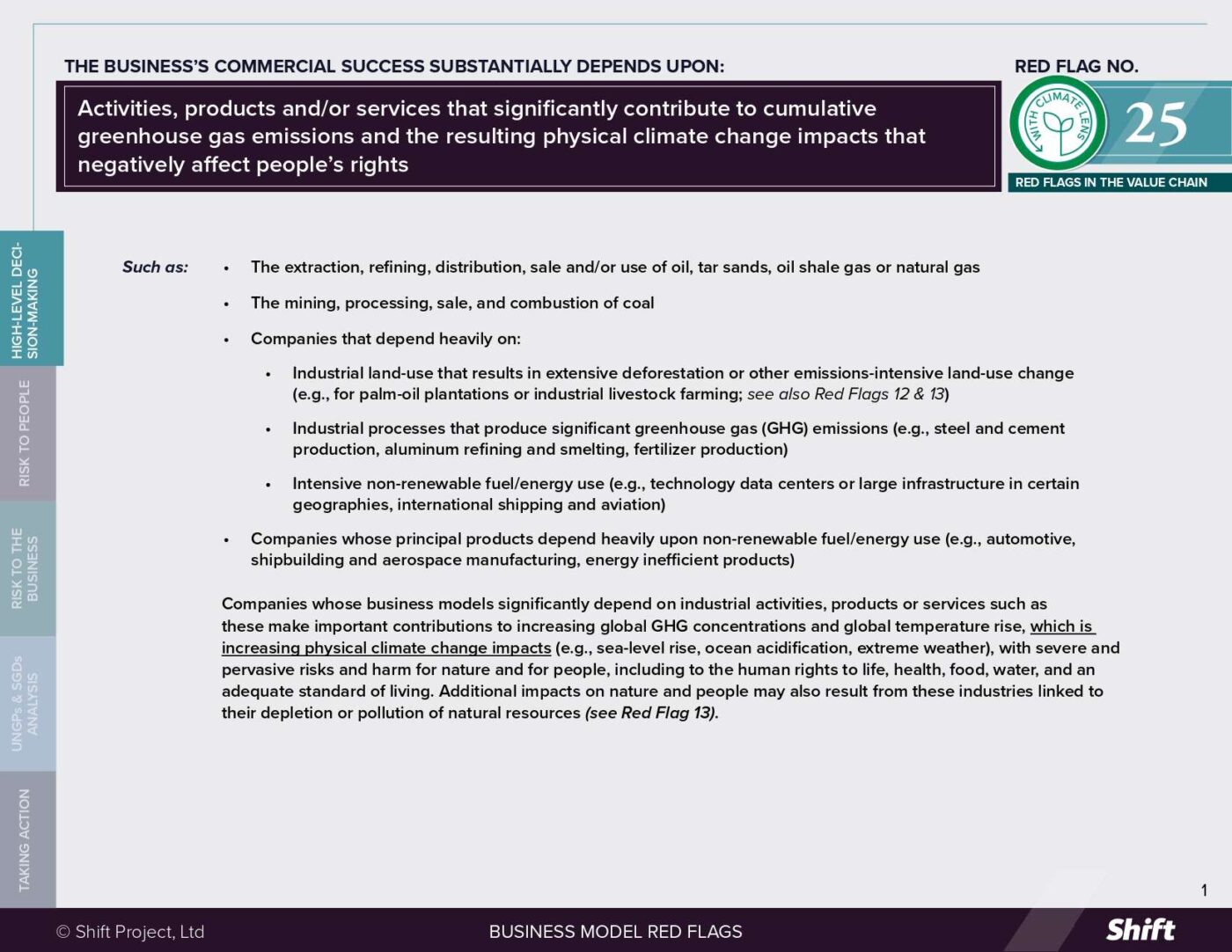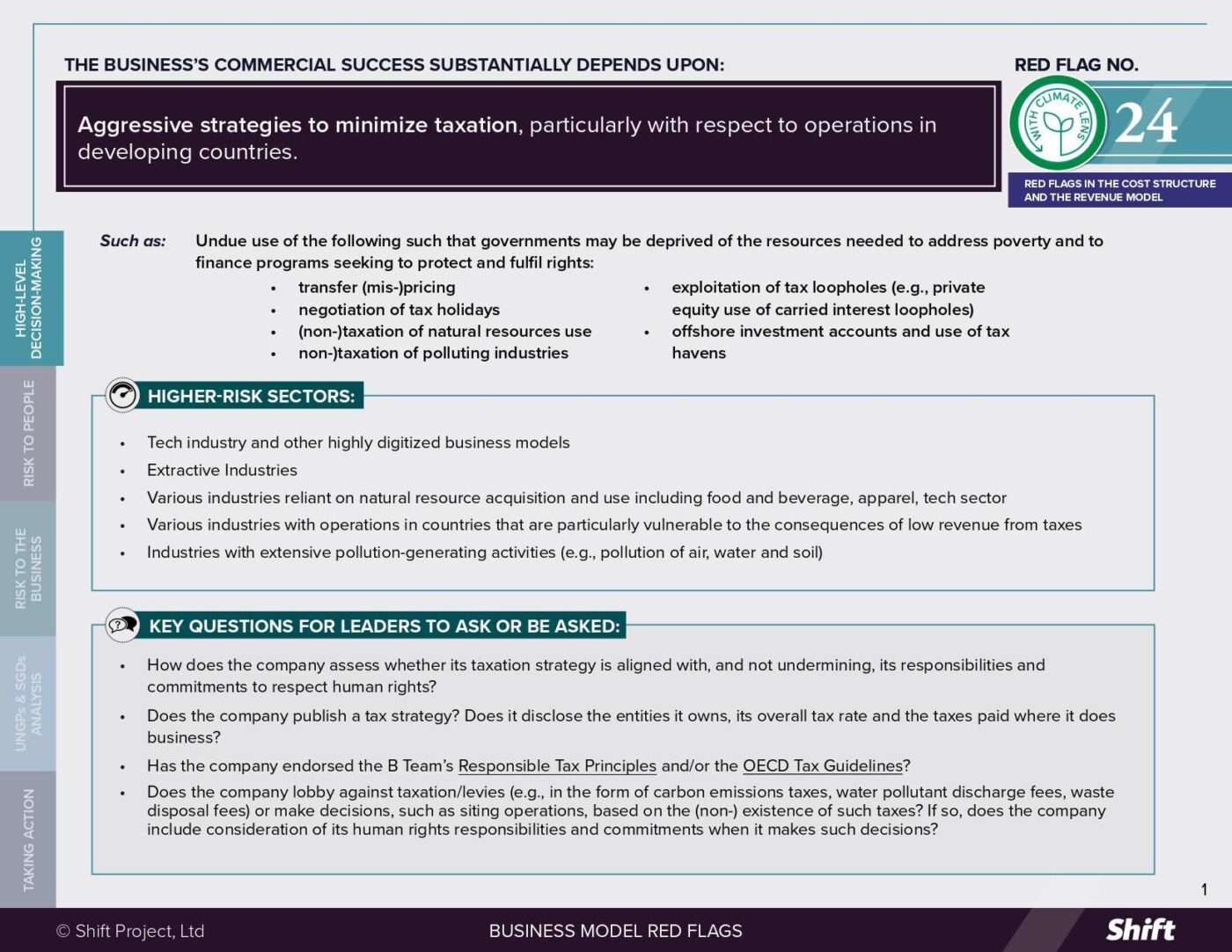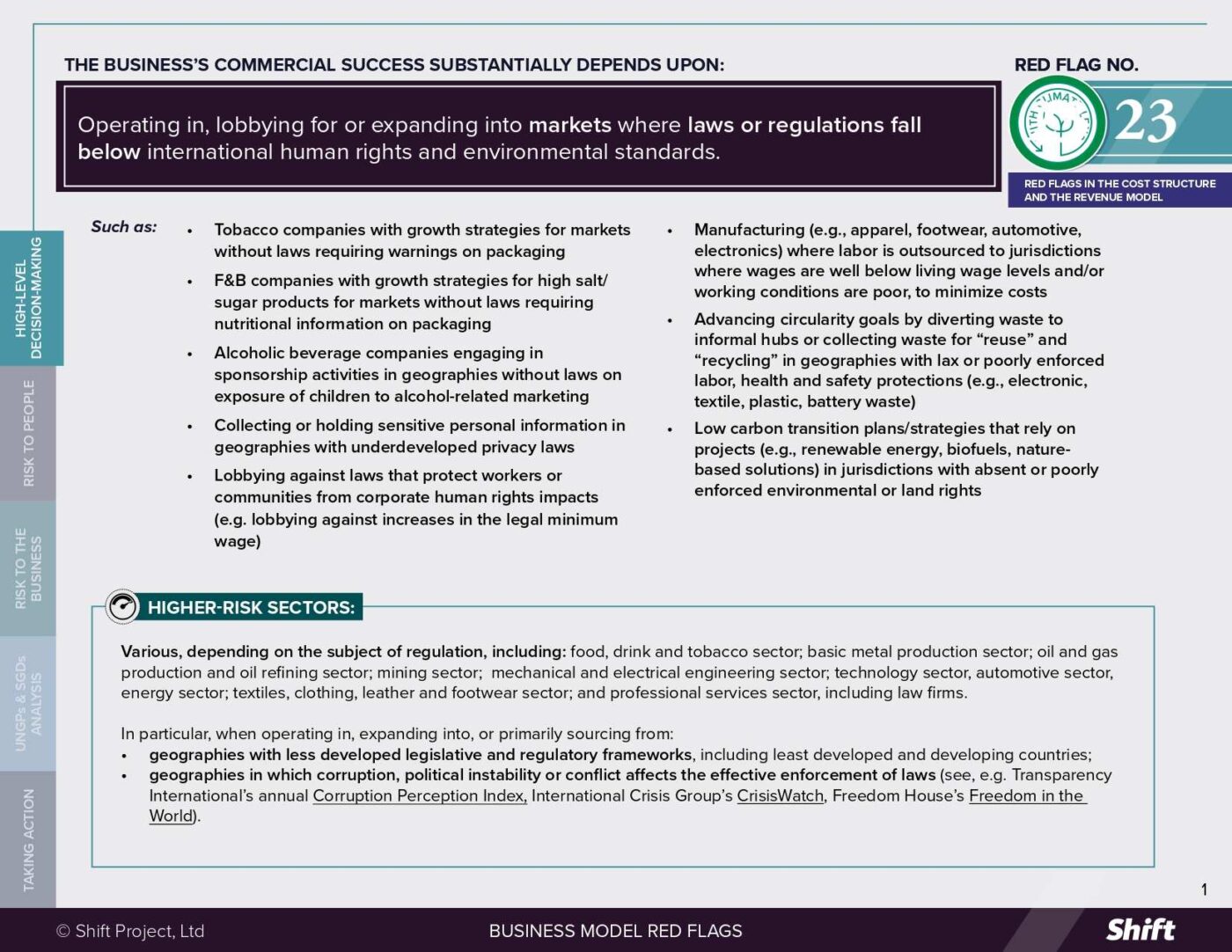Financial institutions and human rights
Public and private sector finance has a critical role to play in advancing business respect for human rights. On the one hand, entities with a close connection to the state – such as development finance institutions, government pension funds and export credit agencies, must do their part in fulfilling the state duty to protect human rights. On the other, when they operate as private companies, they along with commercial banks and institutional investors, have a responsibility to prevent and address risk to people connected to their business.
Regardless of their public or private status, financial institutions, including investors, are uniquely positioned to influence business practice because of their reach. Their products, services, clients and investment portfolios span all sectors and industries, opening the door for them to be catalytic agents of change.
Our aim at Shift is to work hand-in-hand with financial institutions not only to help address their own human rights challenges but also to understand and proactively use their influence in a strategic way that can help shape and move markets to reward respect for human dignity.
“When we work with a commercial bank, an institutional investor or any other financial institution, we are not only helping to change a single business. We are working to transform entire markets.”
ashleigh owens, Financial Institutions Lead
Our approach
We partner with financial institutions to analyze, design, stress-test and fine-tune solutions
Most financial institutions are connected to what seems to be an infinite number of real or potential impacts on people. To those who are working from within financial institutions, the task can seem overwhelming. Where does your institution’s responsibility start and end? How do you manage these issues at such scale? How do you prioritize action with limited time and resources? What should you do if harm has occurred and remedy is needed?
At Shift, we’ve been working with financial institutions, including investors, for years to test solutions and develop a solid understanding of what leading practice should be. We’ve researched and designed creative solutions, tested and fine-tuned them in our one-on-one engagements with leading institutions and nurtured them through the multi-stakeholder processes that we help convene. Above all, we understand how to tailor what we know to the specific reality and challenges of our partners.
Additionally, we invest time and resources into developing insights that can help our partners manage risk and make informed decisions. The best examples of this are the leading tools that we are developing through our Valuing Respect project.
“We don’t believe in pre-packaged, one-size-fits-all solutions, especially in a space where answers are yet to be discovered. Rather, we like to join our partners in collaborative exploration. We love diving into the nuts and bolts of challenges with them to inquire, design, deploy and fine-tune solutions.”
DAVID KOVICK, SENIOR ADVISOR
Common Challenges
Financial institutions vary widely in shape, size, purpose and context. However, over the many years that we’ve worked with banks, investors, export credit agencies, development finance institutions, government pension funds and other actors in both the public and private sector, we’ve seen five fundamental challenges that are common to most of them:
Below, you can find the most common questions that we get from financial institutions that are working to protect and/or respect human rights.
Scope
- What is the scope of a financial institution’s responsibility under the UNGPs?
- How does this change for institutions that have close connections to the state?
- How can a well-crafted policy commitment help embed expectations across an organization that often plays several roles at once – for example, as employer, procurer and provider of both retail and corporate financial services?
Screening
- How can financial institutions more effectively screen an extensive portfolio of clients or investee companies with global exposure to human rights risks?
- What needs to change in current tools and approaches to enable this?
Leverage
- How can financial institutions build and develop innovative, outside-the-box ways to use leverage to mitigate human rights risks connected to clients, investee companies or other business relationships?
- What are leading organizations already doing in this space?
Remedy
- What role can and should a financial institution play to strengthen the broader ecosystem that should deliver remedy when impacts do occur?
- How can this help mitigate future risks?
Disclosure
- How can financial institutions improve their human rights disclosure, while appropriately respecting commercial confidentiality?
- What are the creative approaches being used by leading institutions?
The answers to some of these questions will vary depending on the portfolio, mandate and structure of each institution. But whether they relate to retail banking, corporate lending, project finance or investment, financial institutions need to start off on the right foot. And, as a mission-driven center of expertise, we are here to help.
Our Experience
Commercial Banks
Previous or current engagements: | ABN AMRO | Barclays | Citi Group | ING | Westpac | QNB
Shift has worked with a number of private banks on the challenges they face in integrating respect for human rights throughout their operations, including using leverage in strategic ways to seek to address severe human rights risks. Learn more about our work with businesses.
Export Credit Agencies
We’ve worked with: | GIEK (Norway) | Atradius DSB (The Netherlands) | Export Development Canada (EDC) | Finnvera (Finland) | EKN (Sweden) |
Shift has worked with export credit agencies including GIEK (Norway), Atradius DSB (The Netherlands) and Export Development Canada to help them develop policies and deepen practices on high-risk screening for human rights impacts, the use of leverage with clients and on stakeholder engagement and grievance handling.
Our in-depth assessment of ADSB’s approach is the first such comprehensive evaluation of an ECA against the UNGPs. You can read it here.
Shift has supported EDC to develop and implement a framework for leverage and remedy. It includes policy commitments on leverage and remedy (EDC’s Human Rights Policy), Principles for Leverage and Remedy, a suite of transactional due diligence tools and (up-coming) portfolio-level strategies for areas requiring attention on leverage and remedy.
National Development Finance Institutions
We’ve worked with: CDC (UK) | FMO (the Netherlands) | FinnFund (Finland) | DEG Germany |
Shift has worked with a number of institutions to support the integration of human rights due diligence into their existing environmental and social risk management approaches in both their direct investment and financial intermediary portfolios. Our team has delivered workshops at headquarters and in high-risk markets such as Ethiopia, Honduras and Tunisia and supported their development of guidance notes and tools for clients and investment managers. For example, see our collaboration with CDC on human rights guidance for their investment managers.
Institutional Investors
We’ve worked with: Swedish AP Funds | Norway’s NBIM | PGGM (Netherlands) | New Zealand Superannuation Fund | Network For Sustainable Value Creation (Hållbart värdeskapande)
Shift has worked with several leading asset owners and asset managers on deepening their human rights due diligence approaches, including client engagement.
Driving New Standards
We take the knowledge we gain from working directly with individual organizations and apply it to inform the evolution of key standards influencing financial institution behavior. For example:
- We have provided expert advice to the Equator Principles Association on how to better embed human rights in the framework used by over 90 financial institutions in 35+ countries to assess and manage environmental and social risks in project finance.
- This drew on our earlier collaboration with the International Finance Corporation (IFC) to help clarify the relationship between the UN Guiding Principles and implementation of the IFC’s Environmental and Social Performance Standards.
- Key insights from that work are captured in our public report on Human Rights Due Diligence in High-Risk Circumstances, which has influenced a number of individual institutions’ practices, including through the 2016 revision of the OECD Common Approaches for Export Credit Agencies.
- We played a central role supporting the development of the Dutch Banking Agreement (DBA) – a unique, negotiated contract between banks, civil society and government on what Dutch banks’ human rights responsibilities mean in practice.
- And we played a particular role in driving thinking on the role of banks in enabling remedy, and on the potential for banks to take a whole-of-value-chain approach to understand their connections to systemic human rights risks beyond their immediate client relationships.
- We drew on our experience in these areas in our expert advice to the influential Financial Sector Commission on Modern Slavery and Human Trafficking – an initiative of the governments of Liechtenstein, Australia and the Netherlands, supported by the UN University. The Commission’s Blueprint sets out how the financial sector can scale up its contribution to tackling modern slavery in alignment with the UN Guiding Principles.
-
Shift has provided expert support to Office of the Compliance Advisor/Ombudsman (CAO) on the application of the UNGPs to private sector development finance including remedy and responsible exit.
Engaging States in Their Duty to Protect
From 2018-2021, Shift was engaged by THE FINNISH GOVERNMENT to support a comprehensive approach to integrating the UN Guiding Principles into the work of the main agencies and programs that provide state financing to Finnish businesses investing abroad. This included Finland’s national development finance institution and export credit agency, as well as several tailored programs including one focused on private equity. This remains a rare example of a state taking a holistic approach to meeting its own duty to protect when it comes to providing financial support to business. You can read the key lessons in our final program report.
We have also advised Norway’s development agency, NORAD, on the integration of the UN Guiding Principles into Norway’s overseas development assistance involving the private sector.





